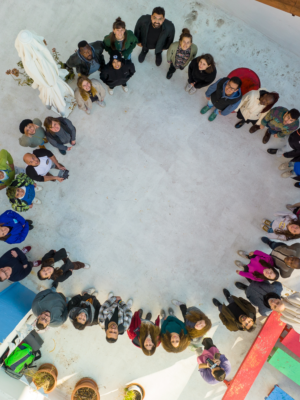Glocal Insight
Racial profiling : the treatment of refugees by the police
“No matter how many years you live here, you will remain a foreigner”
Fatema, visitor to the Victoria Community Centre*
In Greece, racial profiling has become an entrenched issue that deeply impacts the lives of people on the move.
For refugees and asylum seekers, a simple walk in Athens can quickly turn into a distressing encounter with law enforcement. “I was just walking to get groceries when the police stopped me,” says Amir, a visitor to the Victoria Community Center *, “They asked for my papers, searched my bag, and questioned me for 30 minutes. I had done nothing wrong, but they made me feel like a criminal.”
The Victoria neighbourhood, where our space is located, is frequently patrolled by the police. A walk to the centre often turns into document checks, bag searches, or body searches. People on the move are stopped by the police based on their appearance or perceived nationality. These stops are often conducted in a discriminatory manner, forcing individuals to demonstrate their right to be in the country repeatedly. Such encounters are not only humiliating but are also deeply dehumanizing, leaving lasting impacts on those subjected to them.
Profiling involves categorizing individuals based on perceived personal characteristics, such as race, ethnicity, religion, or nationality. When utilized correctly, profiling can serve as a legitimate tool for law enforcement to prevent, investigate, and prosecute criminals. However, when a person’s characteristics are used as the sole or primary reason for stopping an individual, this constitutes racial profiling. This is both unlawful and indiscriminate and particularly acute in Greece, as witnessed in October 2021, when the police killed with 36 bullets an 18-years-old Roman boy during a pursuit.
Elsewhere in Europe, ethnic minorities are disproportionately stopped by the police. The EU Minorities and Discrimination Survey reveals that men, young people, Muslims, and LGBTQ+ are targeted en masse. In some countries, nearly 50% of ethnic minorities report being stopped by police. These interactions are often very invasive, including a complete lack of respect and a demand to show identity papers, in comparison to the general population. The personal impact of these practices is profound.
“Why would I call the police when I need help?” says Asma* “I’m more afraid of them than of the people who might hurt me. They don’t protect us—they treat us like we don’t belong here.”
Living in fear of the police, these communities are reluctant to seek help in emergencies. Adding to these concerns, Greece’s new biometric policing program, introduced in 2019, threatens to intensify racial profiling.These new technologies increase the risk of targeting individuals based on race, ethnicity, or perceived nationality. Human Rights Watch has raised alarms about how these tools could amplify discrimination, leading to even more frequent and invasive stops for refugees and migrants.
The situation is further complicated by recent EU migration policies. In May 2024, the European Parliament approved new rules aimed at creating a common system to manage migration. While these policies are designed to streamline procedures and enhance security, they also risk deepening the divide between those seen as “insiders” and those as perpetual outsiders.
“Everytime I leave my house, I risk my safety and my family’s safety. Maybe the police will stop us and prevent us from coming home. They subject us to humiliating checks, and sometimes we’re taken to the station or even face the risk of deportation” Sireen, undocumented visitor at the Victoria Community Center*
Racial profiling in Greece remains a pervasive issue that undermines trust in public institutions. We must promote a more inclusive society where everyone, regardless of background, can trust in the fairness and effectiveness of law enforcement. At the Victoria Community Centre, Glocal Roots strives to create an inclusive space where visitors feel safe regardless of their legal status.
Addressing racial profiling in Greece is not just about policing; it’s about building a society where equality and justice are more than just ideals—they are realized for each individual.
*names have been changed to protect identity









